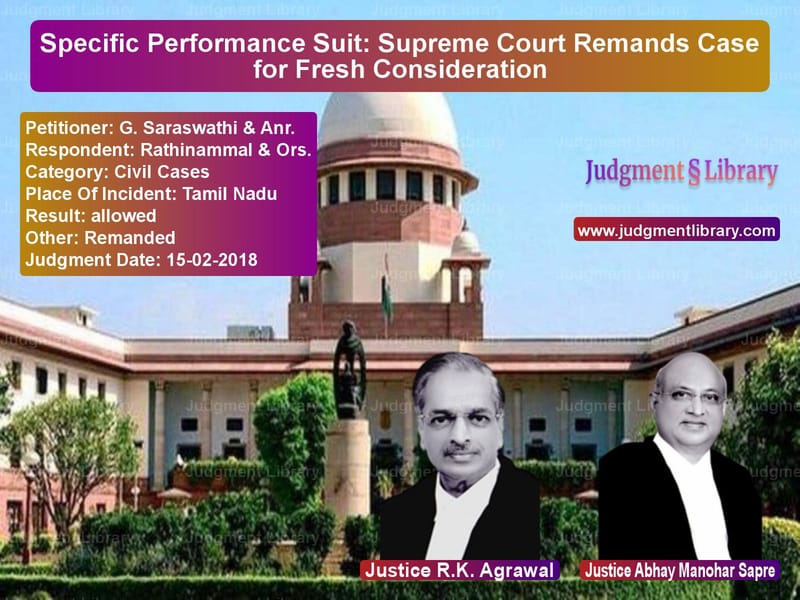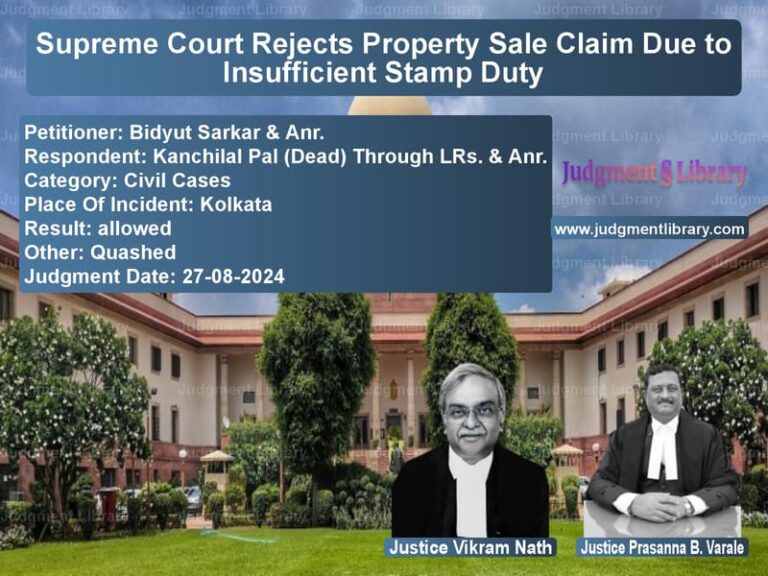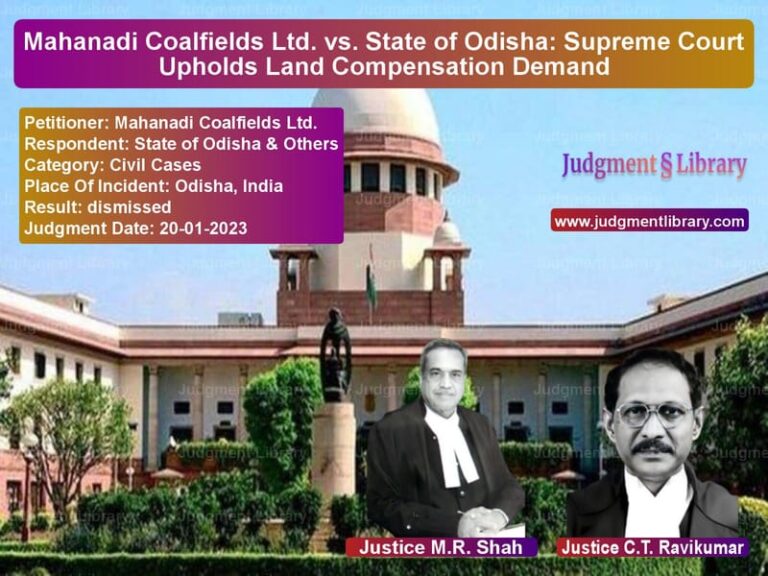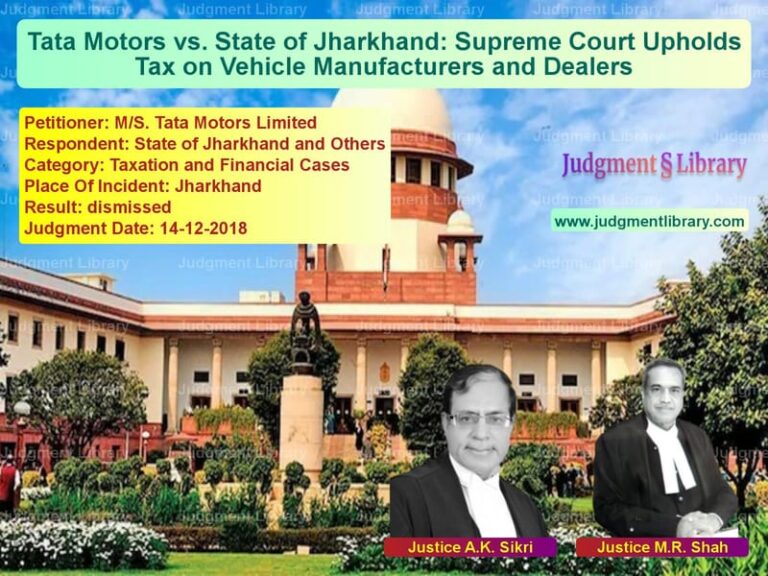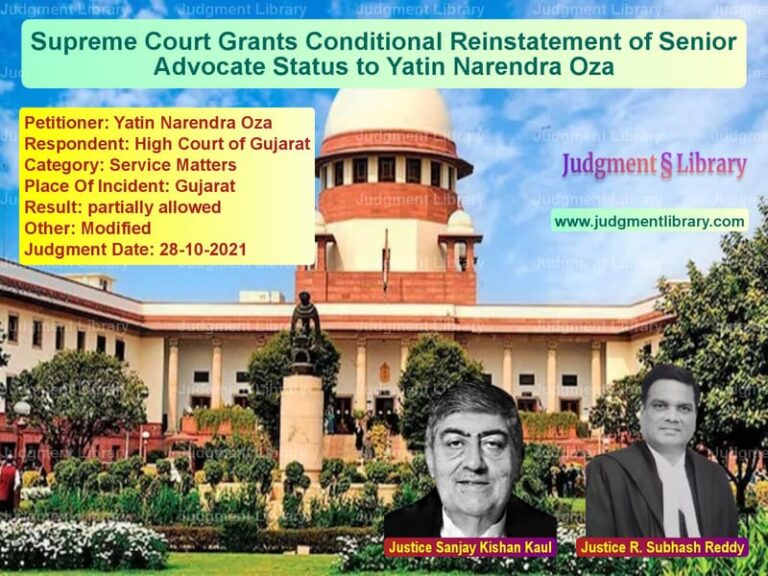Specific Performance Suit: Supreme Court Remands Case for Fresh Consideration
The Supreme Court of India recently ruled in G. Saraswathi & Anr. v. Rathinammal & Ors., setting aside the Madras High Court’s decision due to procedural deficiencies. The judgment highlights the necessity of reasoned orders in appellate proceedings and ensures that courts follow due process in civil litigation.
Background of the Case
The case originated as a suit for specific performance filed by the appellants, G. Saraswathi and another, against the respondents. The plaintiffs alleged that the defendants had entered into a contract but failed to honor the agreement, leading to the civil suit.
The trial court ruled in favor of the plaintiffs and decreed specific performance. The defendants, dissatisfied with the ruling, filed an appeal before the Madras High Court. The High Court’s single bench set aside the trial court’s judgment, dismissing the suit. Subsequently, the plaintiffs filed a Letters Patent Appeal (LPA) before a division bench of the High Court.
The division bench dismissed the LPA in a cryptic order without elaborating on the reasons for upholding the single bench’s judgment. Aggrieved by the summary dismissal, the plaintiffs approached the Supreme Court.
Legal Issues
- Whether the division bench of the High Court erred in dismissing the LPA without providing adequate reasons.
- Whether the High Court’s decision was in conformity with Order 41 Rule 31 of the Civil Procedure Code (CPC), which mandates reasoned judgments.
- Whether the case required remand for fresh consideration on merits.
Arguments Presented
Petitioner (G. Saraswathi & Anr.)
The petitioners argued:
- The division bench’s order lacked reasoning, failing to address the grounds raised in the appeal.
- The appellate court did not examine the factual matrix of the case, nor did it engage with the submissions made by the appellants.
- The judgment did not satisfy the requirements of Order 41 Rule 31 CPC, which mandates that an appellate judgment should contain findings on points raised in the appeal.
- The absence of a reasoned order deprived the appellants of their right to know why their suit was dismissed.
Respondents (Rathinammal & Ors.)
The respondents countered:
- The division bench was justified in affirming the single bench’s judgment.
- The plaintiffs had failed to establish their entitlement to specific performance, warranting the dismissal of their suit.
- The High Court was not obligated to provide a detailed judgment if it found no merit in the appeal.
Supreme Court’s Analysis
1. Deficiency in the High Court’s Judgment
The Supreme Court found that the High Court’s order lacked any discussion of the issues raised in the appeal. The Court noted:
“In the absence of any application of judicial mind to the factual and legal controversy involved in the appeal, it is difficult to sustain such an order.”
The Supreme Court observed that the division bench dismissed the LPA cursorily without engaging with the legal and factual disputes.
2. Requirement of Reasoned Orders
The Court emphasized that appellate courts must issue reasoned judgments, as required under Order 41 Rule 31 CPC:
“The order must contain the narration of the facts of the case, the submissions urged by the parties, the legal principles applicable, and reasons supporting the conclusions.”
The failure to follow this legal mandate, the Court held, rendered the judgment unsustainable.
3. Precedents on Judicial Reasoning
The Court referred to past decisions underscoring the necessity of reasoned judgments. It reiterated that non-speaking orders deprive litigants of their right to a fair hearing.
4. Remand for Fresh Consideration
The Court ruled that, given the procedural deficiencies, the case required fresh adjudication. It directed the High Court to hear the appeal afresh and decide it on merits.
Supreme Court’s Verdict
The Supreme Court allowed the appeal, setting aside the Madras High Court’s judgment. It remanded the matter for reconsideration, instructing the High Court to:
- Provide a reasoned judgment addressing the issues raised in the appeal.
- Ensure compliance with procedural requirements under Order 41 Rule 31 CPC.
- Expedite the hearing and disposal of the appeal.
Implications of the Judgment
This ruling has significant implications for appellate procedures and civil litigation:
- Reinforcement of Judicial Transparency: The judgment mandates that courts provide reasoned orders, ensuring transparency in decision-making.
- Clarification on Appellate Procedure: It reiterates that appellate courts must evaluate the merits of each case rather than dismissing appeals summarily.
- Fairness in Civil Litigation: The decision safeguards litigants’ rights by ensuring that their claims are adequately considered.
Conclusion
The Supreme Court’s ruling in G. Saraswathi & Anr. v. Rathinammal & Ors. reinforces the importance of reasoned judgments in appellate proceedings. By setting aside the unreasoned dismissal, the Court has ensured that litigants receive a fair hearing. This judgment serves as a crucial precedent, emphasizing judicial accountability and procedural fairness in civil disputes.
Petitioner Name: G. Saraswathi & Anr.Respondent Name: Rathinammal & Ors.Judgment By: Justice R.K. Agrawal, Justice Abhay Manohar SapreJudgment Date: 15-02-2018
Don’t miss out on the full details! Download the complete judgment in PDF format below and gain valuable insights instantly!
Download Judgment: G. Saraswathi & Anr. vs Rathinammal & Ors. Supreme Court of India Judgment Dated 15-02-2018.pdf
Direct Downlaod Judgment: Direct downlaod this Judgment
See all petitions in Specific Performance
See all petitions in Contract Disputes
See all petitions in Property Disputes
See all petitions in Judgment by R K Agrawal
See all petitions in Judgment by Abhay Manohar Sapre
See all petitions in allowed
See all petitions in Remanded
See all petitions in supreme court of India judgments February 2018
See all petitions in 2018 judgments
See all posts in Civil Cases Category
See all allowed petitions in Civil Cases Category
See all Dismissed petitions in Civil Cases Category
See all partially allowed petitions in Civil Cases Category

